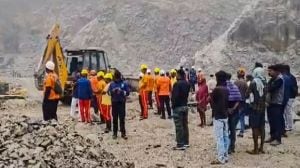Qawali from the fortress
Suicide bom-bers in less than a year have targeted both Pakistan8217;s head of state and the designated head of government. Law and order i...

Suicide bom-bers in less than a year have targeted both Pakistan8217;s head of state and the designated head of government. Law and order in the country is far from secure. Ideological polarisation is at an all-time high. The peace process with India is about to falter once again over a timeframe for resolving the Kashmir dispute. The government8217;s legitimacy remains open to question, making resolution of internal political disputes difficult. But some members of Pakistan8217;s privileged classes, describing themselves as optimists, argue that Pakistan is on the right track. What could be more pessimistic than thinking that this is Pakistan8217;s best moment and that the country cannot really do better?
One group of the so-called optimists points to Pakistan8217;s economic indicators, which admittedly show significant improvements. They make the case that Pakistan8217;s military establishment is committed to economic growth and has come round to recognising the need for investment in the social sectors. It is true, the 8216;8216;optimists8217;8217; acknowledge that Pakistan does not have institutions of state and nation other than the military. But they reason that a few years of sustained economic growth under authoritarian rule backed by American largesse would enable Pakistan to build other institutions. They cite the example of countries like South Korea, where economic development was attained under military rule and a successful transition to democracy followed.
But Pakistan cannot be compared to South Korea for several reasons. South Korea did not face the issues created by an ethnically heterogeneous population and its military was not a party to ethnic disharmony. Moreover, the country had a clear phase of authoritarianism and economic development followed by a sustained evolution towards democracy. Once the military accepted a set of rules, it abided by them and there was no effort to micromanage the political transition. In Pakistan, General Pervez Musharraf has the difficult task of overcoming the credibility gap created by the failure of phased transitions under his preceding military leaders.
Unlike South Korea, where the script for phased nation-building was being written on a clean sheet, Pakistan has to contend with over-writing the ideological and political baggage of the past. In South Korea, the military came first, followed by the Chaebols business conglomerates and both oversaw the evolution of political parties, an independent judiciary and a free press. The military did not interfere with the working of political parties once they had emerged and certainly did not fix elections. The military did not compromise the judiciary by seeking its stamp of approval for the Generals8217; right to rule. All these factors made the phased evolution towards modern institutions of rule of law possible.
In Pakistan, the track record of military rule does not generate confidence. There will always be a strong pocket of resistance to Musharraf8217;s plans because of doubts over his intentions, emanating from the conduct of Generals Ayub Khan, Yahya Khan and Zia-ul-Haq. The so-called optimists have a tough task in overcoming these doubts. The first group of so-called optimists about Musharraf can be described as the 8216;8216;economic growth with external help is the first step in Pakistan becoming another South Korea lobby8217;8217;.
The General has another corner of support from the segment of Pakistani society that can best be described as 8216;8216;cultural liberals8217;8217;. An example of this segment8217;s views can be found in novelist Mohsin Hamid8217;s article in The Smithsonian magazine, titled 8216;8216;Re-inventing Pakistan8217;8217;. The article begins with the words, 8216;8216;One night, as troops from Pakistan8217;s army massed 300 miles away to hunt for remnants of Al Qaeda in the tribal areas bordering Afghanistan, I went to a concert in my hometown of Lahore8217;8217;.
The cultural liberals see the progress of Pakistan through non-political eyes. Ayub Khan and Yahya were fine in their view because music and the arts were not interfered with. Zia-ul-Haq was bad because he intruded in the cultural aspects of liberty. Musharraf is good because basant can be celebrated with ease, music and dance and theatre are alive and the police does not stop and smell people8217;s breath for booze any more. But there is total disregard for what is happening politically in such analysis.
Cultural freedom is, of course, important but it is not equally accessible for all Pakistanis. Moreover, security and political freedom are more important in the long term for a society to move forward. Lahore must be contrasted, for example, with Karachi, where sectarian violence involving groups sponsored or at least tolerated in the past by Pakistan8217;s invisible government remains rife. The Jihadist groups continue to thrive, albeit selectively, and political liberals continue to be harassed throughout and outside the country.
Pakistan8217;s problem as seen by General Musharraf8217;s critics is that he is making no effort to build independent judicial or political institutions. The PML has been taken over by the GHQ in a manner similar to the ones adopted by Ayub Khan and Zia-ul-Haq, leading to a party being 8216;8216;in office8217;8217; without a support base.
There is little move in the direction of rule of law. From the perspective of his critics, General Musharraf has simply reversed General Zia-ul-Haq8217;s strategy for political survival without making fundamental changes in Pakistan8217;s governance. General Zia projected himself as a pious man and secured the support of the ultra-religious segment of the Pakistani population. He maintained a semblance of good relations with India, with several rounds of talks without serious change in overall policy. Zia8217;s primary objective, however, was to consolidate personalised rule and the military8217;s dominance. He succeeded in both, leaving behind social anarchy and a political wasteland.
General Musharraf has decided to cultivate the culturally liberal end of society. Instead of Salat prayer committees he fosters basant committees. Just as religious conservatives praised Zia for encouraging religiosity and piety we have cultural liberals praising Musharraf8217;s tolerance and encouragement of the finer aspects of life. Like Zia, General Musharraf is presiding over economic growth spurred by substantive inflows of foreign assistance. But governance is, in the final analysis, about politics and issues such as inclusion versus exclusion, rule of law versus arbitrariness.
Musharraf8217;s final goal of retaining power for the military does not differ from Zia8217;s. His refusal to allow politics to take its own course and the constant meddling in political matters by security agencies is also similar. Just as Islam pasands Islam lovers under Zia failed to see his repression and the future problems emanating from his support of Jihadism, some Pakistani 8216;8216;optimists8217;8217; appear to ignore Musharraf8217;s pursuit of manipulative politics aimed at keeping GHQ and ISI ascendant.
The 8216;8216;optimists8217;8217; have a desire to project a 8216;8216;positive view of the country8217;8217; reflecting a kind of misplaced patriotism. The truth is, one can find 8216;8216;achievements8217;8217; and 8216;8216;positive developments8217;8217; in all situations. What one must assess is the overall direction of State and society. I would be willing to transform into an 8216;8216;optimist8217;8217; if I felt the State is seriously trying to take away power from the gangs it has armed in the past or if the rulers showed signs of submitting themselves to some established rules and norms. It would be a good sign if Pakistan8217;s Generals appeared willing to submit to judges, for example, or bureaucrats started responding to the common man.
The writer is a Visiting Scholar at the Carnegie Endowment for International Peace in Washington DC. He served as adviser to Pakistani PMs Nawaz Sharif and Benazir Bhutto and as Pakistan8217;s Ambassador to Sri Lanka
- 01
- 02
- 03
- 04
- 05






























